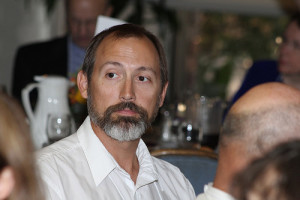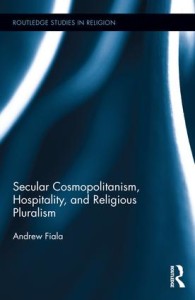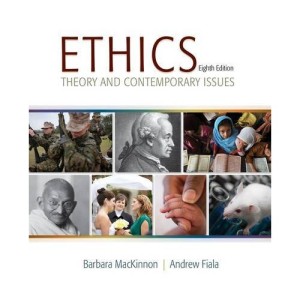
Ethics: Theory and Contemporary Issues. (co-authored with Barbara MacKinnon) is a widely used textbook includes chapters on both ethical theory and a wide range of contemporary ethical issues Illuminating overviews and a selection of readings from traditional and contemporary sources make even complex philosophical concepts reader-friendly. Comprehensive, clear-sighted introductions to general and specific areas of ethical debate cover influential ethical theories, including religion and global ethics; utilitarianism and deontology; natural law ethics; virtue ethics; and feminist and care ethics. Contemporary moral issues discussed include euthanasia, sexual morality, economic justice, animal ethics, war, violence, and globalization. A broader range of voices and philosophical traditions in this edition includes continental and non-Western philosophers, with new readings from prominent ethicists such as Kwame Anthony Appiah, Angela Y. Davis, Mohandas Gandhi, and Richard Rorty. Increased coverage of contemporary dilemmas highlights issues of widespread interest, such as same-sex marriage, structural racism, factory farming, pacifism, and global distributive justice. Ninth edition revision will come out in 2017.
Secular Cosmopolitanism, Hospitality, and Religious Pluralism explores the idea of religious pluralism while defending the norms of secular cosmopolitanism, which include liberty, tolerance, civility, and hospitality. The secular cosmopolitan ideal requires us to be more tolerant and more hospitable toward religious believers and non-believers from diverse traditions in our religiously pluralistic world. Some have argued that the world’s religions can be united around a common core. This book argues that it is both impossible and inadvisable either to reduce religion to one thing or to deny religion. Instead, the book affirms non reductive pluralism and seeks to understand how we should live in a pluralistic world.
Building on work in the sociology of religion and philosophy of religion, the book examines the grown of religious diversity (and the spread of nonreligion) in the contemporary world. It argues that religious toleration, hospitality, and compassion must be extended in a global direction. Secular cosmopolitanism recognizes that each person has a right to his or her deepest beliefs and that the diversity of the world’s religious and non-religious traditions cannot be reduced or eliminated.
The Bloomsbury Companion to Political Philosophy is the definitive guide to contemporary political philosophy. The book covers all the most pressing and important themes and categories in the field – areas that have continued to attract interest historically as well as topics that have emerged more recently as active areas of research. Fourteen specially commissioned essays from an international team of experts, including Eduardo Mendieta and Gillian Brock, reveal where important work continues to be done in the area and, most valuably, the exciting new directions the field is taking. The Companion explores a range of issues from the nature and history of political philosophy, sovereignty, distributive justice, democratic theory, feminist theory, to toleration, human rights, immigration, cosmopolitanism, peace, war, and the challenge of Eurocentrism in political philosophy. Featuring a series of indispensable research tools, including an A to Z of key terms and concepts, a chronology, a detailed list of resources, and a fully annotated bibliography, this is the essential reference tool for anyone researching or working in political philosophy.
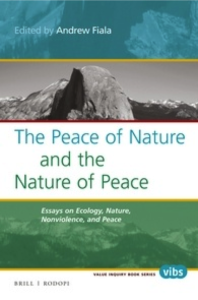 The Peace of Nature and the Nature of Peace is a collection of philosophical essays, based upon papers that were given by members of Concerned Philosophers for Peace at a conference held in Yosemite Valley in 2013. The collected essays provide critical reflection on nonviolence, ecology, environmental ethics, and the philosophy of peace. The introductory essay by Andrew Fiala examines links between environmental movements, peace philosophy, and nonviolent activism.
The Peace of Nature and the Nature of Peace is a collection of philosophical essays, based upon papers that were given by members of Concerned Philosophers for Peace at a conference held in Yosemite Valley in 2013. The collected essays provide critical reflection on nonviolence, ecology, environmental ethics, and the philosophy of peace. The introductory essay by Andrew Fiala examines links between environmental movements, peace philosophy, and nonviolent activism.
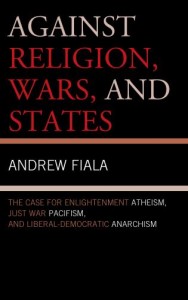
In Against Religion, Wars, and States: The Case for Enlightenment Atheism, Just War Pacifism, and Liberal-Democratic Anarchism, Andrew Fiala argues that, societally, we must radically redefine our goals. A renewed focus on global justice, a heightened criticism of religion and a fuller embrace of enlightened humanism and the sciences are just some of the ways in which we can begin to address some of the problems endemic to our society, and ultimately bring about more lasting peace. Fiala argues both theoretically and empirically, moving from analyses of theology, ethics and political philosophy to case studies and data mined from these respective disciplines, and from the fallout of recent world events involving all three. Fiala attempts to wean us off of our deferral to the oppressive forces that spark movements like Occupy, and the Arab Spring, forces that manifest themselves in the brutal drug wars along our borders, and in the currently fractious and bigoted rhetoric of some of our most powerful political and religious leaders. Against Religion, Wars, and States provides a provocative, unified, and revolutionary critical theory for all who are skeptical of the religious, political, and military powers that be, and points the way towards a more peaceful, just and reasoned future.
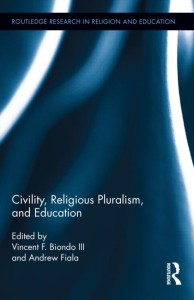
Co-Edited with Vincent Biondo
Civility, Religious Pluralism, and Education (2013)
This book focuses on the problem of religious diversity, civil dialogue, and religion education in public schools, exploring the ways in which atheists, secularists, fundamentalists, and mainstream religionists come together in the public sphere, examining how civil discourse about religion fit swithin the ideals of the American political and pedagogical systems and how religious studies education can help to foster civility and toleration.

Public War, Private Conscience (2010)
Public War, Private Conscience offers a philosophical reflection on the moral demands made upon us by war, providing a clear and accessible overview of the different ways of thinking about war.
Engaging both with contemporary examples and historical ideas about war, the book offers unique analysis of issues relating to terrorism, conscience objection, just war theory and pacifism. Andrew Fiala examines the conflict between utilitarian and deontological points of view. On the one hand, wars are part of the project of public welfare, subject to utilitarian evaluation. On the other hand, war is also subject to deontological judgment that takes seriously the importance of private conscience and human rights. This book argues that the conflict between these divergent approaches is unavoidable. We are continually caught in the tragic conflict between these two values: public happiness and private morality. And it is in war that we find the conflict at its most obvious and most disturbing.
The Just War Myth (2008)
As the war in Iraq continues and Americans debate the consequences of the war in Afghanistan, the war on terror, and the possibility of war with North Korea and Iran, war is one of the biggest issues in public debate. Andrew Fiala in The Just War Myth challenges the apparently predominant American sentiment that war can be easily justified.
The Just War Myth argues that while the just war theory is a good theory, actual wars do not live up to its standards. The book provides a genealogy of the just war idea and also turns a critical eye on current events, including the idea of preemptive war, the use of torture, and the unreality of the Bush Doctrine. Fiala warns that pacifism, too, can become mythological, advocating skepticism about attempts to justify war.

What Would Jesus Really Do?(2007)
What Would Jesus Really Do? The Power and Limits of Jesus’s Moral Teachings examines what Jesus says (and doesn’t say) about complicated contemporary ethical issues including abortion, euthanasia, the death penalty, war, homosexuality, and the family.
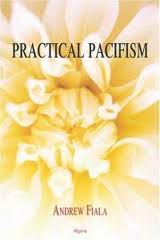
Practical Pacifism (2004)
The United States has a unique responsibility and opportunity to use democracy to end war; but, after 9/11, many can no longer imagine pacifism in any form. Practical Pacifism argues for an approach to peace that aims beyond religion toward a moral consensus that is developed pragmatically through dialogue aimed at overlapping consensus.

Tolerance And The Ethical Life (2005)
This book shows how tolerance connects with the practice of philosophy. Appeals to specialists and upper-level students in Ethics and Political Philosophy, both for its unique historical exploration of tolerance and its application of those results to present-day moral theory.
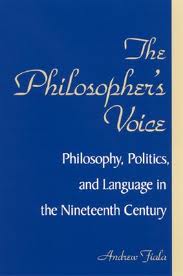
The Philosopher’s Voice (2002)
This analysis of the relationship between philosophy and politics recognizes that political philosophers must continually struggle to distinguish their voices from others that clamor within political life. Fiala asks whether it is possible to maintain a distinction between philosophical speech and other political and poetic language.


